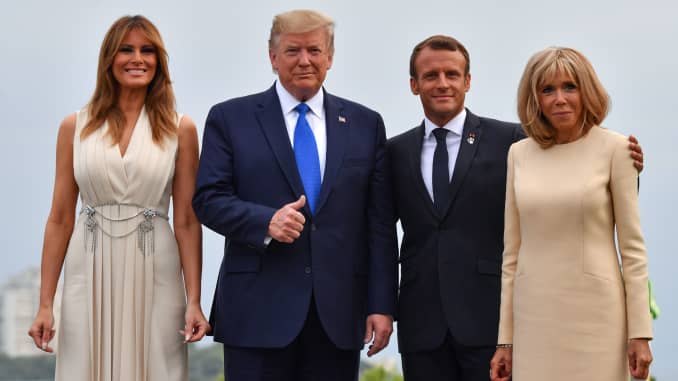World powers need to help the US win a trade deal with China, says ex-Trump negotiator
- One “critically important” thing to a trade deal is unity from allies — and it is in the “self-interest” of Europe, Japan and others to work with the U.S. on those trade issues, he added, said former top White House negotiator Clete Willems.
- In fact, French President Emmanuel Macron already alluded to his concern over China when he called for reforms of World Trade Organization rules at the Group of 7 summit in France, said Willems,
- At the G-7 summit, France — on behalf of the seven countries — released a statement calling for reforms of the WTO. They include: to protect intellectual property more effectively, to settle disputes more quickly, and to eradicate unfair commercial practices.
World powers should work with the United States to get a deal with China as unfair trade practices affect everyone, former top White House negotiator Clete Willems told CNBC Tuesday.
“If folks in Japan, in the EU, U.K., France want to see more certainty around China … they should help the United States … to pressure China to help get a deal, ” Willems told CNBC Tuesday. “Because their companies are suffering from these very same unfair trade practices.”
In fact, French President Emmanuel Macron already alluded to his concern over China when he called for reforms of World Trade Organization rules at the Group of 7 summit in France, said Willems, who left his role as deputy director of the U.S. National Economic Council (NEC) in March.
One “critically important” thing to a trade deal is unity from allies — and it is in the “self-interest” of Europe, Japan and others to work with the U.S. on those trade issues, he added.
Issues around forced technology transfer have been a sticking point in the U.S.-China trade talks, and Washington has consistently accused Beijing of intellectual property theft — something China has denied.
“I thought what President Macron said today was really useful — he basically talked about how the WTO needed to be reformed to deal with unfair trade practices, with intellectual property protection … that’s really code for ‘we’re also concerned with China,’” Willems said.

Willems used to serve as the lead trade negotiator for the U.S. at summits like the G-7 and G-20, and also participated in trade talks in Washington and Beijing. He was a right-hand man to NEC Director Larry Kudlow on trade with China.
“I think that the message coming out of the G-7, more than anything, was one of unity,” Willems said. “I hope the administration in the United States can capitalize on that.”
At the G-7 summit, France — on behalf of the seven countries — released a statement calling for reforms of the WTO. They include: to protect intellectual property more effectively, to settle disputes more quickly, and to eradicate unfair commercial practices.
The “most effective way forward” in settling trade relations with China is to ensure that trade is “part of international trade rules,” Macron said at a joint press conference with U.S. President Donald Trump.
Referring to China as a major economy with “lots of investment” from the U.S., Europe, Canada and Japan, he said: “The problem is respecting intellectual property, dealing with excess capacity, which sometimes unbalances some world markets, and the ability to deal rapidly with conflicts we may have and with unfair situations.”
China and the U.S. have gone back and forth in the past week over their trade discussions, on the back of fresh tariffs on each other’s goods.
Trump said Monday that China wants a deal “very badly,” and that U.S. officials have received calls from the Chinese on their desire to return to the negotiating table. But Chinese foreign ministry spokesman, Geng Shuang, said he was not aware of a phone call between the two sides.
China on Friday said it would impose new tariffs on $75 billion worth of American goods. In retaliation, Trump said he would hike tariff rates on $550 billion of imports from China.